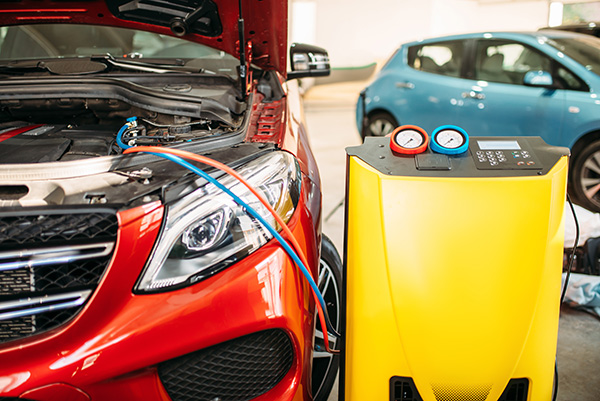
If your car’s air conditioning isn’t blowing cold, takes forever to cool down, or suddenly smells odd, it’s not something to ignore. A failing A/C system can go from inconvenient to costly if you don’t catch the warning signs early. And with today’s A/C systems being more complex and electronically controlled, small problems can quickly grow into bigger issues.
Whether your A/C has stopped working completely or just doesn’t feel as strong as it used to, there’s usually a reason behind it—and it’s better to address it now than wait for a full breakdown in the middle of summer.
Lukewarm Air Is the Most Common Red Flag
If you set your A/C to full blast but only get slightly cool or lukewarm air, something’s off. This is often a sign that refrigerant levels are low, usually due to a leak somewhere in the system.
Refrigerant is what allows your A/C to remove heat from the cabin. When there’s not enough of it, the system can’t cool effectively. Unfortunately, refrigerant doesn’t just “run out”—if it’s low, there’s a leak that needs to be found and fixed before refilling the system.
Our technicians use dye tests and pressure readings to locate the leak, which could be in a hose, condenser, evaporator, or even a rubber O-ring. Once the source is repaired, the system can be safely recharged.
Weak Airflow or Uneven Cooling
If the air is cold but barely blowing out of the vents, you could be dealing with a clogged cabin air filter or a failing blower motor. The cabin filter collects dust, pollen, and debris—but when it’s too full, it restricts airflow.
Blower motors and fan resistors also wear out over time. If you notice airflow coming and going, or if only certain speeds work, there’s a good chance the fan assembly needs attention.
Uneven cooling between driver and passenger sides (in dual-zone systems) might point to a blend door actuator issue, where small motorized doors inside the dash stop opening and closing correctly.
Unusual Noises Can Point to Mechanical Trouble
Your A/C system should be nearly silent when it’s working correctly. If you hear clicking, hissing, or grinding, that could mean trouble with the compressor or internal components.
The compressor is the heart of the A/C system. If its clutch fails or internal components begin to wear, it can make loud noises—and eventually stop functioning altogether. Replacing a compressor isn’t cheap, so catching these sounds early can help prevent total failure.
Buzzing or rattling noises from behind the dashboard might indicate a failing blend door or something obstructing airflow inside the duct system.
Bad Smells When You Turn on the A/C
If you notice a musty, moldy, or sour smell coming from your vents, that usually means mold or bacteria is growing in the evaporator or ductwork. This happens when condensation sits in the system and doesn’t drain properly—especially in humid environments like Rhode Island.
We offer A/C sanitization treatments that clean the system and eliminate odors. But if the smell returns quickly, it may be time to inspect the drain lines, cabin filter, or even the evaporator for deeper cleaning or repair.
It’s Important to Act Early
A/C issues don’t usually get better on their own. Minor symptoms often lead to larger and more expensive repairs if they’re left unchecked. Low refrigerant can damage the compressor, restricted airflow can overheat components, and electrical faults can cause other systems to fail.
Routine inspections and early service keep your A/C system running efficiently—and save you from sweating it out when summer hits full force.
From leaks and filters to full system repairs, Elite Auto Repair in Warwick, RI, is your local source for expert air conditioning service. Call today!